- Home
- Iain Banks
The Crow Road Page 8
The Crow Road Read online
Page 8
"Not McHoan, by any chance?" I asked.
"Yep," Ash nodded.
"Hmm," I said. Because McHoans are fairly thin on the ground around here. Or anywhere, for that matter.
"Who was this guy?"
"Journalist. There to cover the big knock-down."
"What was his name?"
"Rudolph something, I think somebody called him. He wouldn't say."
"You might have used your feminine wiles."
"Well, at the time they were more or less fully employed on a systems analyst from Texas with shoulders wide as the prairie sky and a gold company Amex card, to be perfectly honest, Prentice." Ash smiled sweetly.
I shook my head. "Saucy bitch."
Ash grabbed my balls through my 501s and squeezed gently. My breath baled out.
"Language, Prentice," she said, then released, covered my mouth with hers, wiped my teeth with her tongue, then swivelled, walked away.
"Wow," I said. The old testes were complaining, but only slightly. I cleared my throat. "Night, Ashley," I said, cool as I could.
Ash turned, grinning, then reached into her big, naval-looking jacket with the brass buttons and fished something out; threw it.
I caught the projectile; a little lump of grey concrete, smooth and dark on one side.
"Die Mauer," she said, walking backwards. "Actually from the section near the Brandenburg Gate where it said, 'Viele viele bunte Smarties!. The red paint on one surface used to be in the middle of the dot in the last 'i'. Bit of the world that used to be between Germanics." She waved. "Night, Prentice."
I looked at the grainy chunk of concrete in my hand. "Wow," I breathed. Ash's fair hair flared briefly under the street light, then dimmed as she walked away. "Wow!"
CHAPTER 4
He looked round the Solar of the castle. The big new window at the gable end of the hall was still covered with a translucent plastic sheet which rustled in the wind and crackled as the rain blew onto it. A shifting grid of dark lines was the shadow of the scaffolding outside. The high-ceilinged hall smelled of paint, varnish, new wood and drying plaster. He walked over to one of the mullioned windows, and stood there, looking out at the low clouds as they drifted over Gallanach, soaking the dull town with the curving veils of rain they dragged beneath them, like the train of some vast grey gown.
"Daddy, daddy! Uncle Fergus says we can go up on the roof with mum if we're careful! Can we? Please can we? Promise we won't jump off!" Lewis skipped into the hall, dragging little Prentice behind him. Lewis had his anorak back on, and Prentice was dragging his behind him over the shining parquet floor.
"Aye son, I suppose so," Kenneth said, sitting on his ankles to pull the younger boy's jacket on and zipping it up. Lewis went leaping and whooping round the hall while this was going on. "Not so loud, Lewis," Kenneth said, without much conviction.
Prentice smiled at his dad. "Daddy," he said in his slow, croaky voice. "Need the toilet."
Kenneth sighed, pulled the child's hood up, then pushed it back down again. "Aye well; your mum will take you. Lewis!" he shouted. Lewis darted guiltily away from the paint pots he'd been examining at the other end of the hall, and came running over.
"This is great, daddy! Can we get a castle too, aye?"
"No. We can't afford it. Take your brother back to his mum; he needs the toilet."
"Aww," whined Lewis, staring accusingly at his young brother, who just grinned at him and wiped his nose on one cuff of his anorak. Lewis prodded Prentice in the back. "You're always spoiling things!"
"Do as you're told, Lewis," McHoan said, straightening. His knees complained as he did so. "On you go. And be careful on that roof." He waved them both towards the double doors they'd entered through.
Lewis made a show of plodding off, clumping one foot in front of another, body swaying exaggeratedly. He was pulling Prentice by one toggle of his anorak hood.
"By the hand, Lewis," Kenneth said wearily.
"You're a pest, boy," Lewis told his younger brother as they reached the doorway.
Prentice turned and waved to his dad with his free hand. "Bye, daddy," the wee voice said. Then he was pulled out of the room.
"Bye, son," McHoan said, and smiled. Then he turned back to the window and the rain.
* * *
"It's a bit damp still."
"Ach, yer no afraid of a bit a wet, ur ye? Yer no a girrul ur ye.
"No I'm not a girl. But if I get my clothes mucky —»
"Your dad's rich; he can buy you new clothes."
"Aye — yer paw's rich. You could probably have new claes every day if you wantit."
"Don't be ridiculous. All I'm saying —»
Kenneth could see both points of view; Lachy, in a grimy shirt held together by odd buttons and a safety pin, and tattered, patched short trousers that drooped below his knees and had probably belonged to at least two elder brothers, was already grubby (and sporting the vivid remains of a black eye no one had mentioned because it had probably been his dad who gave it him). Fergus had nice, well-fitting clothes on: grey serge short trousers, a new blue jersey and a tweed jacket with leather patches sewn on the elbows. Even Kenneth felt a little dowdy in comparison. His shorts had been darned at the back, though he was getting a new pair when the next clothes rations came through. The girls all wore skirts, blouses and jerseys; their socks were white, not grey. Emma Urvill had a coat with a little hood that made her look like a pixie.
"Are we playing this game or not?" she asked.
"Patience," Lachy said, turning to the girl, still standing holding her bike. "Patience, lassie."
Emma looked skywards and made a tutting noise. Beside her, Kenneth's sister, Ilsa, also on her bike, shook her head.
The castle stood on the side of the hill. The tall trees around it were still dripping, and its rough, uneven stones were dark and wet from the rain that had not long stopped. A watery sun gleamed on the dark leaves of the ivy that clung to one side of the ruin, and in the forest behind, a wood pigeon cooed softly.
"Oh, what the heck," Fergus Urvill said, and rested his bike against a tree.
Lachy Watt let his bike fall to the ground. Kenneth lowered his to the damp grass alongside. The girls propped theirs against the wooden rails at the start of the bridge. The short wooden bridge, about wide enough for a cart, crossed a steep, bush-choked gully about thirty feet deep. At the bottom of this tiny, dank glen a burn splashed and foamed; it rushed out of the woods, curled round three sides of the rock and grass knoll the roofless castle stood upon, fell over a small waterfall, then progressed gently afterwards joining the River Add near the main road, so that eventually its waters flowed through and beneath the town of Gallanach and into the bay near the railway pier.
Sun came suddenly, making the grass bright and the ivy leaves sparkle; the wind pushed through the forest with a quiet roar, releasing drops of water all around. Kenneth watched a train on the viaduct at Bridgend, about a mile away; the west wind was keeping its noise from them, but he could see the steam rising quickly from the dark locomotive and whipping back over the half-dozen burgundy coaches in little white clouds that spread and were torn apart and flung away by the wind.
"Right," Lachy said. "Who's het?"
"Het?" Fergus said. "You mean 'it'?"
"You know what ah mean; who's goin het first?"
"Do One potato, Two potato," suggested Emma.
"Oh Goad, all right," Lachy said, shaking his head.
"And you shouldn't take the Lord's name in vain," Emma told him.
"Christ, Ah'm sorry," Lachy said.
"You did it again."
"You a Tim or sumhin?"
"I'm a Christian," Emma said primly. "And I thought you were, too, Lachlan Watt."
"Ah'm a Protestant," Lachy said. "That's what am are."
"Can we get on with this, please?" lisa said.
They all lined up, fists clenched; Lachy ended up being it, much to his own annoyance.
Kenneth had never been inside
the old castle; you could just see it from the house, if you knew what you were looking for, and you could see it quite well if you used dad's binoculars, but it was on the Urvill estate, and even though their families had been friends for years — generations, dad said, which meant even longer — Mr Robb, on whose farm the castle stood, didn't like children, and chased them off his fields and out of his woods whenever he could, threatening them with his shotgun. He couldn't chase Fergus and Emma Urvill off though, so they were all safe. Kenneth had wondered if Mr Robb was secretly a fifth columnist or even a Nazi, and was hiding men washed up from a sunken U-boat, or preparing a place for paratroopers to land, but despite him and some of the other children watching Mr Robb very carefully from the woods a few times, they had never been able to prove anything. But they had explored the hidden garden a bit, and decided the castle looked worth investigating.
The castle had dark, intact dungeons at ground level, and a stone stair-case in a circular tower that rose to the open heart of the ruin, where a few jumbled stones and a floor of earth and weed looked up to the sky. The stairs wound further up inside the corner tower, pausing at each long-collapsed floor above, where a doorway looked out onto the central well. Another stairway pierced the walls themselves on the far side of the shell of the keep, rising through their thickness past another three doorways hanging like internal balconies, to a couple of small rooms at the top of dark chimneys which led to the base of the walls outside.
The castle held a variety of other dark nooks and shadowy crannies you could hide in, as well as windows and fireplaces set high in the thick walls, where you could climb if you were good at climbing, and if you were really good you could climb up from the circular stairs to the very summit of the ruin, where you could walk, if you dared, right round the thick tops of the walls, over the weeds and the ivy, sixty feet or more above the ground. From there you could look out to sea, over Gallanach, or into the mountains to the north and the forested hills to the south. Closer, there was the overgrown walled garden, across another bridge behind the castle, where tangles of rhodies crowded under monkey-puzzle trees and a riot of exotic flowers attracted buzzing clouds of insects in the summer.
The rules were that you could hide anywhere in the castle; Kenneth and the others left Lachy at the track side of the bridge, counting slowly. They laughed and squealed, bumping into each other and shushing each other as they tried not to shout too loudly while they dithered and giggled over where to hide.
Kenneth climbed up into a high window and crouched down. Eventually, Lachy came into the open hall of the castle, looking around. Kenneth watched him for a moment, then ducked back in, flattened himself down as close to the stone sill of the window as he could.
He was the last to be found, and for a while delighted in the fact that none of them could find him, even after Lachy had caught the rest and they were all shouting at him to come out so they could have another go. He lay there, feeling the damp breeze coming through the window and tickling the hairs on his bare legs. He listened to the shouts of the others, echoing in the castle's emptied shell, and to the voices of the crows and the wood pigeons in the trees, and he smelled the dark, wet smell of the moss and weeds that had found a foothold amongst the ruin's grey stones. He kept his eyes tightly closed, and as he listened to them search for him and call on him, there came a strange, tight, quivery feeling in his tummy which made him want to clench his teeth and bring his knees together and made him worry about wetting his pants.
I love this here, he thought to himself. I don't care if there is a war on and Fergus's uncle got killed in North Africa, and Wullie Watt got killed in the North Atlantic and Lachy gets hit by his dad and we might have to move to another house because Mr Urvill wants ours back and I don't understand trigonometry and the Germans do invade us; I love this. If I died right now I wouldn't care; wouldn't care at all.
Lachy climbed right up onto the top of the walls eventually, and only then did he see Kenneth. Kenneth came down, yawning widely and rubbing his eyes and claiming he had fallen asleep. He'd won, had he? Oh, jolly good.
They played some more, and made fun of Fergus after he'd won a game because Kenneth had worked out what the two little rooms at the top of the second set of stairs were; they were toilets, and that was why the chimneys led down and went out of the castle; it was so all the number one and numbers twos could fall down there. Fergus had hidden down a latrine! And him worried about getting his clothes dirty, too! Fergus denied they were toilets; they were completely clean and didn't smell at all and they must be chimneys.
"Chimneys, ma arse!" Lachy laughed. "They're shite-holes!"
(Emma tutted, but couldn't help smiling.)
"Chimneys!" Fergus insisted desperately, blinking hard. He looked at Kenneth as though expecting him to agree. Kenneth looked down at the tramped-down earth under his feet.
They're shite-holes, so they are," laughed Lachy. "And you're just a big jobbie!"
"Chimneys," Fergus protested, his voice rising, his face going red.
"Big jobbie, big jobbie; big smelly jobbie!" Lachy chanted.
Kenneth watched Fergus shake with anger while Lachy danced round the interior of the keep, singing out, "Big jobbie, big jobbie; big smelly jobbie!"
Fergus stared angrily at his sister and at Kenneth, as though betrayed, then just stood and waited for Lachy to get bored with his taunting, and as Kenneth watched, a blank, emotionless expression gradually replaced the anger on Fergus's face.
Kenneth had the fleeting, extraordinary impression of seeing something buried alive, and felt himself shake suddenly, almost spastically, shivering.
"… jobbie, jobbie; big smelly jobbie!"
* * *
In the last game, Kenneth hid with Emma Urvill in one of the dungeons, showing her how to turn her back to the light and put the hood of her coat up to hide her face, and sure enough when Ilsa came to the door of the dungeon — and he felt that quivering, scary, glorious feeling in his tummy again — she didn't see them, and they hugged each other once she had gone, and the hug was warm and tight and he liked it and she didn't let go, and after a while they put their mouths together and kissed. He felt a strange echo of that terrifyingly wonderful sensation in his belly and his heart, and he and Emma Urvill held onto each other for ages, until all the others were caught.
Later, they played in the tangling undergrowth of the walled garden, and found an old over-grown fountain with the stone statue of a naked lady in it, and an old shed at one corner where there were ancient tins and jars and bottles with Victorian-looking writing on them. The rain came on for a while and they all stayed in there, Fergus complaining about his bike rusting, his sister and Kenneth exchanging the occasional sly look, Ilsa staring out at the rain and saying there were places in South America where it hadn't stopped raining for hundreds of years, and Lachy mixing various sticky, treacley subtances together from the shelves of old bottles and tins, trying to find a combination that would explode, or at least burn, while the rain hammered then whispered then dripped on the tarred roof overhead, and plopped through holes onto the springy wooden floor of the shed.
* * *
"Of course, we haven't moved all the bottles yet," Fergus said, pointing with his pipe at the still unfilled racks that covered the wall of the cellar. The cellar was painted white, and lit by naked bulbs; wires hung and there were unplastered holes for cables and plumbing leading through the walls and up to other floors. The wood and metal wine racks gleamed, as did the two hundred or so bottles that had already been stored.
"Should keep you going for a bit, eh, Fergus?" he grinned. "Once you've filled this lot up."
"Mmm. We were thinking of touring a few vineyards next summer," Urvill said, scratching his thick chin with his pipe. "Bordeaux; the Loire, that sort of thing. Don't know if you and Mary fancy making a foursome or not, hmm?"
Fergus blinked. Kenneth nodded. "Well, perhaps. Depends on holidays and that sort of thing. And the kids, of course."
"Ah, well, no; of course not," Kenneth said, as they went to the door. Fergus switched the lights out in the various cellars and they went up the stone-flagged steps towards the utility room and kitchen.
It was that cellar, he thought to himself as he followed Fergus's Hush Puppies up the steps. That was where I hid with Emma Urvill, and kissed her. That cellar; I'm sure it was that one. And that window I was looking out earlier; that was the one I hid in that day, nearly thirty years ago; I'm certain.
He felt a terrible weight of time and loss settle on him then, and a slight feeling of resentment at the Urvills in general and Fergus in particular, for having — with so little thought — stolen part of his memories from him. At least malice might have acknowledged the value of his nostalgia.
"Ferg, this dishwasher's like a Chinese Puzzle," Fiona stood up from the recalcitrant machine, then saw her brother and smiled broadly, came towards him, hugging.
"Hiya, Ken. Been getting the guided tour, have you?"
"Yes; very impressive." Kenneth kissed his sister's cheek. How old had she been when he'd come out here with Fergus and the rest? About two, he guessed. Not old enough to come all this way on a bike. He must have been eight or nine. He wondered where Hamish had been; ill, maybe. He'd always been taking colds.
Fiona Urvill, nee McHoan, wore old flared Levis and a loose green blouse knotted over a white T-shirt. Her copper-coloured hair was tied back. "How're you?"
"Oh, I'm well," Kenneth nodded; he kept an arm round her waist as they walked over to the dishwasher, where Fergus crouched, consulting the instruction booklet. The door of the dishwasher was hinged open like a drawbridge.
"Appears to be written in code, my dear," Fergus said, scratching the side of his head with his pipe. Kenneth felt a smile form on his face as he looked down at the man. Fergus seemed old before his time: the Pringle jumper, the Hush Puppies, even the pipe. Of course, Kenneth could remember when he used to smoke a pipe; but that had been different. Looked like Fergus was losing his hair already, too.

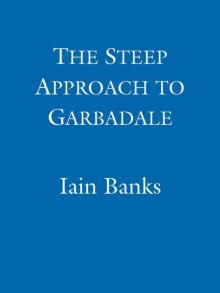 The Steep Approach to Garbadale
The Steep Approach to Garbadale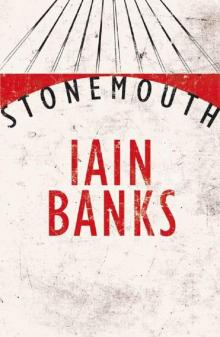 Stonemouth
Stonemouth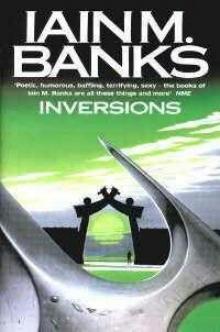 Inversions c-6
Inversions c-6 Raw Spirit: In Search of the Perfect Dram
Raw Spirit: In Search of the Perfect Dram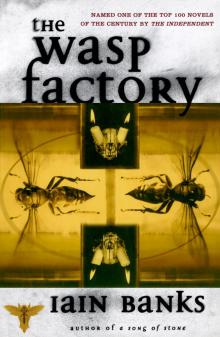 The Wasp Factory
The Wasp Factory Raw Spirit
Raw Spirit Walking on Glass
Walking on Glass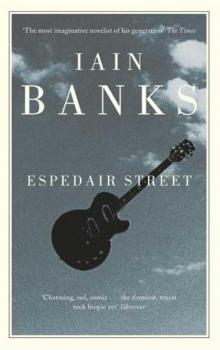 Espedair Street
Espedair Street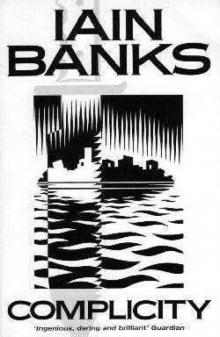 Complicity
Complicity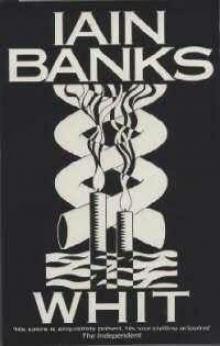 Whit
Whit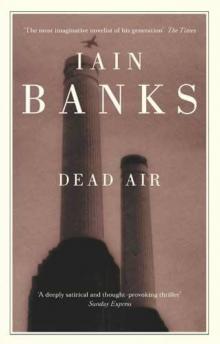 Dead Air
Dead Air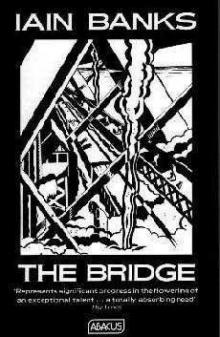 The Bridge
The Bridge The Business
The Business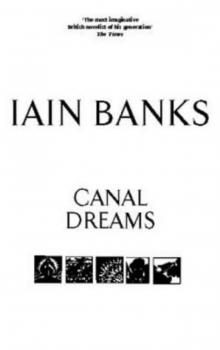 Canal Dreams
Canal Dreams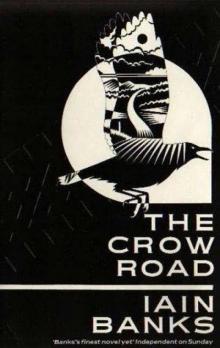 The Crow Road
The Crow Road